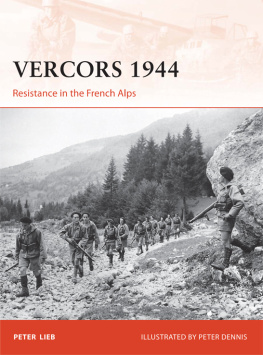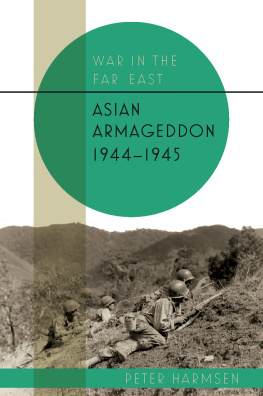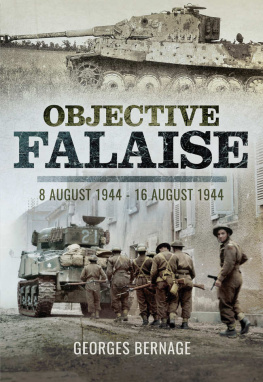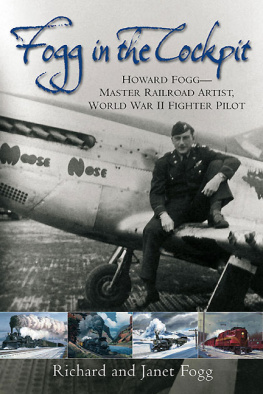Peter Lieb - Vercors 1944
Here you can read online Peter Lieb - Vercors 1944 full text of the book (entire story) in english for free. Download pdf and epub, get meaning, cover and reviews about this ebook. genre: Non-fiction. Description of the work, (preface) as well as reviews are available. Best literature library LitArk.com created for fans of good reading and offers a wide selection of genres:
Romance novel
Science fiction
Adventure
Detective
Science
History
Home and family
Prose
Art
Politics
Computer
Non-fiction
Religion
Business
Children
Humor
Choose a favorite category and find really read worthwhile books. Enjoy immersion in the world of imagination, feel the emotions of the characters or learn something new for yourself, make an fascinating discovery.
- Book:Vercors 1944
- Author:
- Genre:
- Rating:5 / 5
- Favourites:Add to favourites
- Your mark:
- 100
- 1
- 2
- 3
- 4
- 5
Vercors 1944: summary, description and annotation
We offer to read an annotation, description, summary or preface (depends on what the author of the book "Vercors 1944" wrote himself). If you haven't found the necessary information about the book — write in the comments, we will try to find it.
Vercors 1944 — read online for free the complete book (whole text) full work
Below is the text of the book, divided by pages. System saving the place of the last page read, allows you to conveniently read the book "Vercors 1944" online for free, without having to search again every time where you left off. Put a bookmark, and you can go to the page where you finished reading at any time.
Font size:
Interval:
Bookmark:
CAMPAIGN 249
Resistance in the French Alps
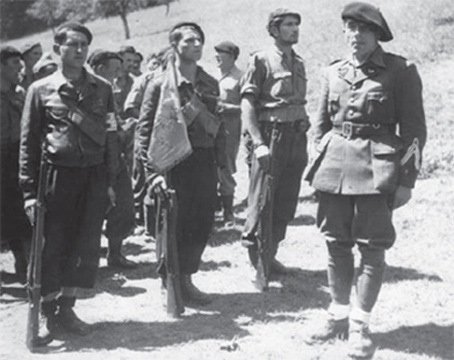
| PETER LIEB | ILLUSTRATED BY PETER DENNIS |
Series editor Marcus Cowper
NOTES ON TERMINOLOGY FFIMAQUIS
The terms FFI and Maquis often give rise to confusion amongst readers of books on the French Resistance. Whilst the FFI were formed in early 1944 to give the Resistance a military character, the Maquis stemmed from escapees of the STO who were initially unarmed and more or less outlaws. The word, however, soon became synonymous with the armed resistance against the occupation and Vichy. Generally, Resistance fighters with a military background favoured the term FFI, whilst those with a civilian origin preferred Maquis. For the sake of simplicity both terms are used synonymously in this book. The communists often preferred to call themselves partisans, while the Germans called the FFI/Maquis/partisans either terrorists or bandits.
NOTES ON PHOTOS
Finding photos for this book turned out to be a real challenge in many ways. Soldiers from both sides, German and French, were actually forbidden to take photos for security reasons. As a consequence, the number of photos from the actual fighting in the Vercors and the Tarentaise is very limited. However, a number of men ignored the ban and smuggled their snapshots back home.
ABBREVIATIONS
| AS | Arme Secrte (Secret Army) |
| BA | Bundesarchiv |
| BCA | Bataillon de Chausseurs Alpins (Mountain Infantry Battalion) |
| BCRA | Bureau Central des Renseignements et dAction (Central Office for Intelligence and Action) |
| FFI | Forces Franaises dIntrieur (French Forces of the Interior) |
| FTPF | Francs-Tireurs et Partisans Franais (French Free-Shooters and Partisans) |
| GMR | Groupes Mobiles de Rserve |
| HSSPF | Hherer SS-und Polizeifhrer (Higher SS and Police Commander) |
| IWM | Imperial War Museum |
| KdS | Kommandeur der Sicherheitspolizei und des Sicherheitsdienstes (Commander of the Security Police and the Security Service) |
| KG | Kampfgeschwader (Combat Wing) |
| LLG | Luftlandegeschwader (Airborne Wing) |
| MRV | Muse de la Rsistance in Vassieux |
| MTM | Muse des Troupes de Montagne |
| OG | (US) Operational Group |
| ORA | Organisation de Rsistance de lArme (Resistance Organization of the Army) |
| OSS | Office of Strategic Services |
| RAF | Royal Air Force |
| Sipo/SD | Sicherheitspolizei und Sicherheitsdienst (Security Police and Security Service) |
| SOE | Special Operations Executive |
| SPOC | Special Projects Operations Centre |
| STO | Service du Travail Obligatoire (Forced Labour Service) |
| USAAF | United States Army Air Force |
| USMC | United States Marine Corps |
It appeared to be one of the biggest mysteries of military history; in little more than six weeks during late spring 1940 the German Wehrmacht overran the French Army an army that had previously been regarded as the best in the world. The new French government under the old Marchal Philippe Ptain had to agree to an armistice with its arch-enemy on 22 June 1940, in exactly the same railway carriage in which the 1918 armistice had been signed. France was largely occupied; the north and the west of the country came under German military administration, whereas the south remained officially independent under Ptains authoritarian regime and was often named after its capital: Vichy France. She was allowed to keep an army of 100,000 men and, even in the German-occupied north, her administration and her police.
Despite the shocking defeat, many Frenchmen rallied around the old Marchal, the hero of the battle of Verdun in 1916. After all, he had saved France with his steadiness in those dark days of World War I. In contrast the socialist-communist government of the Popular Front was widely regarded as having betrayed the country by neglecting the armament of the army in the face of the German threat in the 1930s, and the communists had sabotaged the nations war efforts in 193940 against the Soviet-allied German enemy. These thoughts shot through the minds of many Frenchmen in the early days of the German occupation and Ptains authoritarian regime, with his Rvolution Nationale and the slogan travail, famille, patrie (work, family, homeland), promised to sort out the perceived mess. Certainly, most of the French still despised or hated the Germans, even though, during the occupation, their soldiers behaved surprisingly correctly. However, in the early days of the occupation many French considered the Boche a lesser evil than those they perceived as enemies within French society, namely the communists and foreign Jews.
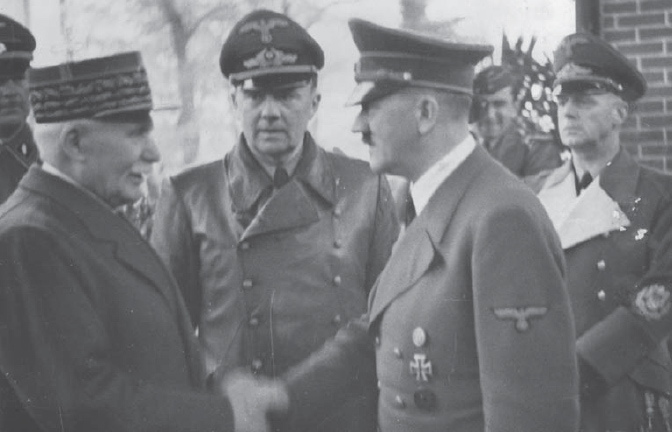
Hitler and Ptain. The symbol of the Vichy French collaboration with Nazi Germany: the Vichy head of state Marchal Philippe Ptain (left) and Adolf Hitler meet in Montoire, October 1940, to discuss Frances role in the New Europe. (BA, 183 H-25217)
Almost no other aspect of the German occupation in France is as controversial and as heatedly discussed as the FrenchGerman collaboration. It is certainly not helpful to view it in stark black and white terms. Between 1940 and 1942 it seemed fairly unlikely France would soon be liberated and hence most ordinary Frenchmen adopted a wait-and-see attitude, which was later called attentisme. The presence of the occupiers could not just be ignored and, on a daily basis, the French had to cooperate with them to a certain degree or at least accommodate them. The Vichy government collaborated for a different reason; in the first months and years in particular it tried to comply with the Germans in many ways in order to reserve a privileged place for France in Hitlers Europe. This does not mean that Vichy politicians were pro-German, often quite the opposite. However, a similar attitude towards common enemies, such as communists or foreign Jews (in contrast to French Jews), helped to forge this GermanFrench collaboration. In security matters, for example, French police forces maintained law and order, which allowed the Germans to run the country with a minimum of their own forces for a maximum outcome. Furthermore, Vichy maintained its responsibility for the entire civil administration system; the Germans only intervened if they felt their interests threatened. Although the Vichy collaboration, and particularly the collaboration of its police forces, dwindled away after 194243, the French administration kept on working for the Germans until summer 1944.
In autumn 1942 the Allied landings in French North Africa reversed the entire strategic situation in the Mediterranean. Vichy Frances army had offered little resistance to the Allied invasion and Hitler feared the southern French coast could provide the Allies with a springboard into western Europe. Thus German (and Italian) troops entered into the hitherto unoccupied zone on 11 November 1942. The French Army was dissolved, but the Germans decided to keep the police force and the administration alive. Officially Vichy even remained the legal government in France, but in reality it held little power, becoming a mere puppet for the occupiers. Two other events changed the domestic situation in France over the course of 1943. Firstly, it became more and more obvious Germany would not win the war, having suffered one setback after the other: the capitulation of 6. Armee in Stalingrad in February and of Heeresgruppe Afrika in Tunis in May, the failed summer offensive at Kursk in July, the Allied landings on Sicily and southern Italy in July and August, Italys capitulation in September and finally the Wehrmachts constant withdrawals on the eastern front. Secondly, Vichys strategy of accommodation and collaboration had led to a dead end and had not brought any tangible success. The situation worsened when Vichy passed a law introducing a compulsory labour service, the Service du Travail Obligatoire (STO), on 16 February 1943. Young Frenchmen had to go to Germany to work in factories and the armament industry. The STO was the last nail in the coffin; Vichy had lost its credibility in the eyes of the French public, even though Marchal Ptain still enjoyed widespread popularity. Many young people decided to dodge the STO and sought refuge in remote rural areas, particularly in southern France. The Maquis was born! Although initially the Maquisards were neither automatically Resistance fighters nor organized in any form, the Resistance was able to recruit from a large reservoir of manpower. The term Maquis would soon become a synonym for the armed Resistance in general.
Next pageFont size:
Interval:
Bookmark:
Similar books «Vercors 1944»
Look at similar books to Vercors 1944. We have selected literature similar in name and meaning in the hope of providing readers with more options to find new, interesting, not yet read works.
Discussion, reviews of the book Vercors 1944 and just readers' own opinions. Leave your comments, write what you think about the work, its meaning or the main characters. Specify what exactly you liked and what you didn't like, and why you think so.

